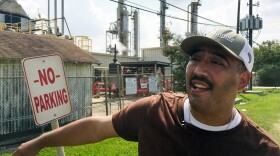
Rebecca Hersher
Rebecca Hersher is a reporter on NPR's Science Desk, where she reports on outbreaks, natural disasters, and environmental and health research. Since coming to NPR in 2011, she has covered the Ebola outbreak in West Africa, embedded with the Afghan army after the American combat mission ended, and reported on floods and hurricanes in the U.S. She's also reported on research about puppies. Before her work on the Science Desk, she was a producer for NPR's Weekend All Things Considered in Los Angeles.
Hersher was part of the NPR team that won a Peabody award for coverage of the Ebola epidemic in West Africa, and produced a story from Liberia that won an Edward R. Murrow award for use of sound. She was a finalist for the 2017 Daniel Schorr prize; a 2017 Pulitzer Center on Crisis Reporting fellow, reporting on sanitation in Haiti; and a 2015 NPR Above the Fray fellow, investigating the causes of the suicide epidemic in Greenland.
Prior to working at NPR, Hersher reported on biomedical research and pharmaceutical news for Nature Medicine.
-
The 16th century epidemic, likely set off or exacerbated by European invaders, was one of the most deadly in human history. New evidence traces it to a type of salmonella that causes a deadly fever.
-
Scientists have discovered the proboscis butterflies use to suck nectar from flowers existed before flowers did. So: What were ancient butterflies using their long, tongue-like suckers for?
-
Thistle tortoise beetles have enormously long, hooked penises that are rigid in some parts and soft in others. Scientists hope studying the beetle penises could help people design better catheters.
-
Penitent penguins. A seal aghast. A turbocharged wigeon, a vain gnu and a kickboxing kangaroo. We have the photos.
-
The tick was with a feather from a dinosaur that lived in the Cretaceous Period. Modern ticks love to bite mammals, and scientists have long wondered what the tiny vampires ate millions of years ago.
-
After the 2012 mass shooting at an elementary school in Newtown, Conn., there was a spike in gun sales. A study examined the spike and links increased gun exposure to more accidental firearm deaths.
-
The same guidance principle that governs how missiles intercept moving targets also describes how the falcons, which are known to dive at 200 mph or more, plummet to catch their prey.
-
After years of budget and political pressure, some climate scientists are changing the way they describe their research, and avoiding the term "climate change."
-
Scientists at NASA's Goddard Spaceflight Center are hoping to use virtual reality technology to study space, and Earth, without leaving their offices. Talented high school students are helping.
-
Hurricane Harvey caused industrial facilities to release an extra 5.98 million pounds of air pollution. Some people who live and work near the plants are frustrated with the federal response.








